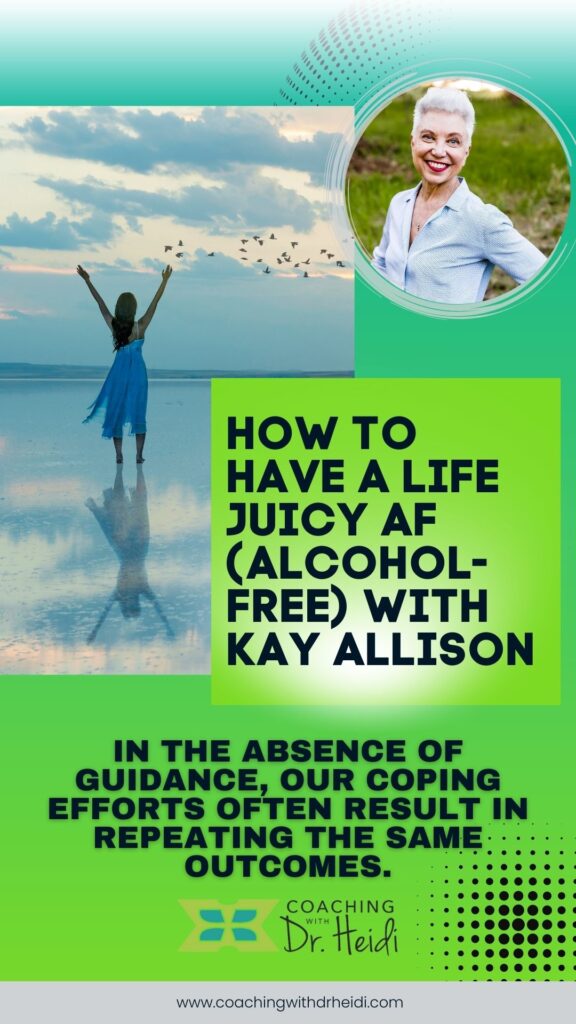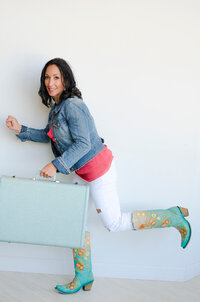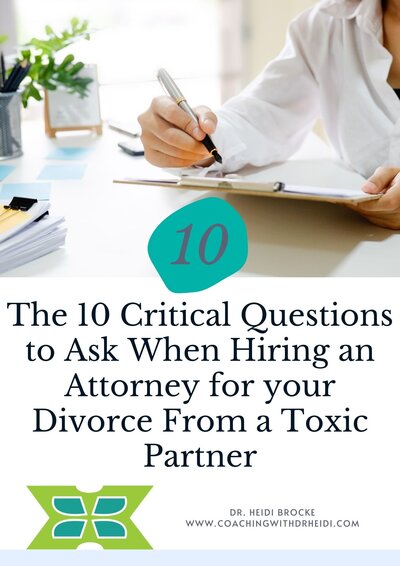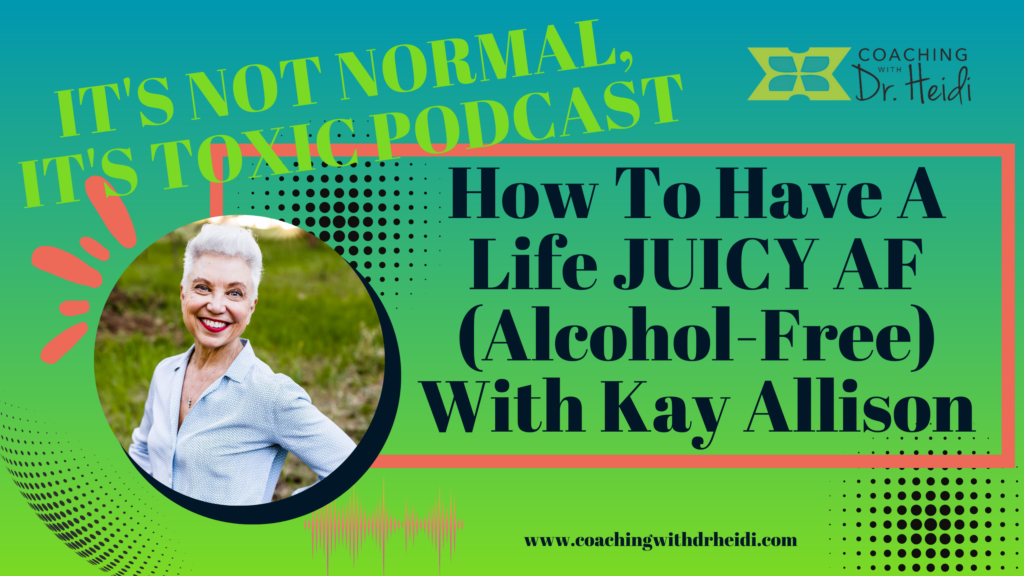Have you ever wondered how much alcohol contributes to unhealthy relationships?
Have you ever wondered why we turn to alcohol so much when we’re suffering?
On Today’s Episode of The, It’s Not Normal, It’s Toxic Podcast Toxic Relationship Awareness and Healing Specialist, Dr. Heidi talks with Kay Allison, Creator of Juicy AF! (alcohol-free!)
This is a great conversation; As I listened to her talk I realized that we cope with one thing by using another so it can easily become a prison of running and hiding from the things we either can not or do not want to face head-on.


In today’s episode of It’s Not Normal, It’s Toxic Podcast, we talk with Author Kay Allison ways to live alcohol free.
What I realized in this conversation is sometimes we may not have the guidance to know how to cope so we do the best we can and in doing so many end up with just more of the same. Kay has seen this in herself and I think there is a huge truth to this even in my own life.
Listen To The Episode Now
Listen & subscribe on your favorite platform:
Key Tips and Takeaways from this episode
- The correlation between Kay’s drinking and the toxic relationships in her life
- Why she wrote the book ” JuicyAF” and who it is for.
- How her journey has transformed her ability to navigate challenging people.
- Helping women create their ideal life, alcohol-free
- Overcoming the shame around defaulted to alcohol
- Why busy working moms in stressful lives revert to alcohol
- AND MORE…..
Listen on Youtube Here.
More About Kay Allison Here
Kay Allison helps professional women break their drinking habits and get free… free from booze, free from shame, and free from anxiety. After Kay went alcohol-free, she increased her income 600% and married the love of her life. Her book, Juicy AF* (*Alcohol-Free) Stop The Drinking Spiral. Create Your Future., and her course “30 Days to Freedom for Professional Women” provide a step-by-step guide for high-achieving women.
Learn More about her at https://juicyaf.life/
Please Like and Share:
If you are struck by something, please feel free to share, rate, and review!
If there is something you hear in this episode that inspires you, please leave a comment or submit a contact us form and tell me all about it; I’d love to hear from you.
Connect on Instagram:
https://www.instagram.com/coachingwithdrheidi/
Connect on Facebook:
https://www.facebook.com/coachingwithdrheidi/
A few resources for you:
The 10 Critical Questions To Ask When Hiring An Attorney for Your Divorce From A Toxic Partner
—————————
Transcript:
Welcome to it’s not normal, it’s toxic, rid your life of toxic people. I’m Dr. Heidi. I am a toxic relationship awareness and healing specialist. My mission is to provide hope, healing and freedom to those whose lives have been affected by toxic relationships, emotional abuse, and narcissistic behaviors. Though I am not a licensed mental health professional, I have been there, I have done the work and I have healed. I am someone who has spent several years walking a similar path to yours. My role is to provide you the education to understand your situation for what it really is, to help you regain your own power. And ultimately, step into your new life of freedom. You can find me and all my services at coaching with Dr. heidi.com.
Hey everybody, welcome back. As you know, this is it’s not normal, it’s toxic. I am Dr. Heidi, your host. And today we have someone who who might be even more outgoing than me, which is big. If you’re watching the video, one look at this woman, and you’ll see what I’m talking about. She has great big, huge red glasses on and they’re adorable. And it makes me want to do something like that. So today, I want to welcome Kate Allison. I’m just gonna welcome you. This is where you say hi, everyone. Hey, everybody, thanks so much for having me. Dr. Heidi,
yes, and I we have not spoken, we’ve just correlated through email. And so as you could tell, I was super excited to kind of get to know you, because I already knew that your personality was very vibrant. I know that you know, about the work that I do, personally, and I know that that you can relate to the work and you can relate to why I do the work. And you can relate to the situations that the people that are listening to this podcast are in. And there’s one thing that you have that I don’t relate to very well. And obviously, that’s why when I was introduced to you, I thought yes, she needs to be on here. Most of the listeners have have heard bits and pieces of my story. But there’s, there’s one aspect of my story that I can’t speak to from a place of experience, I speak to it a lot, but not from a place of experience. And that that subject is where addictions and alcohol ties into the toxic relationship both on on both sides in the toxic relationship. I believe that when my former relationship was getting worse, so towards the end, I was I was not really a drinker I have talked about I was raised in this little tiny Christian community and like, like We’d sneak wine coolers, maybe, you know, and so I was just raised that it just wasn’t part of my environment. So it just, it didn’t really, it was never really a drive for me because I never saw it. When I was married to my former, there was an occasional bottle of wine, or there was an occasional, you know, six pack of fuzzy navels or whatever. But we just weren’t real drinkers. And now today, I’m thankful because I have seen the residual since he did start drinking, what the aftermath is with the, you know, his consecutive relationships. But when when it was getting towards the end, I really started liking wine. And it was kind of when wine got big. And, you know, everything was wine on coasters and wine on T shirts, and all that. And I was separated in in a different house and I bought a box of wine. Okay, as anybody knows, it’s very easy to pour a glass of wine and then pour another glass of wine. And then we never pour a glass of water and then pour another glass of water and then pour another glass of water. Right. And, and I think one of the things that kept me from tripping up is I had a friend, no idea why she even brought this up. Because I had never really had a history with alcohol. But she said, you’re in a very vulnerable place. So don’t be sitting at home pouting drinking glass after a glass of wine. If you if you’re going to drink wine in this stressful time in your life, limit yourself to two glasses because she said I’ve seen people go down. That’s all she said. And she had no. I mean, she had no inclination that I was going to do that she had no history of seeing me do anything like that. It just came out of her mouth. And I’ve never, ever forgotten it. And I do think that that was the universe’s way of going. Here you go take it or leave it and I latched on to it. So I’m super thankful for that. But you have a business, I’m thinking it’s a business, right? And if it helps you see a F, and you have awful lines in the gutter like me, I know exactly what you’re thinking, but it’s actually stands for juicy alcohol free, correct?
It does. And it can stand for the other two Sure. Why not?
Can we have an eye? Well, I like to swear on my podcast, but when I swear then I have to text my dad and go up dad. Sorry about that, because he listens to all of them. And I really did want to say that. But I will save it for later in the show. So so now that they kind of know why I have you on the show. I want you to just go and tell us a little bit about you and how you got here and whatever about your story you want. If if if I if I feel like I need to interject with the question, I’ll stop you and the listeners don’t care if they hear me interrupt. They hear me interrupt all the time. That’s That’s great. So you have the floor, my dear.
All right. So here’s what I do I help successful women. Experiment with being alcohol free for a period of time. There 30 days, 90 days, whatever it happens to be, were more success in their professional lives and more peace at home, and quite frankly, being happier with themselves. What I noticed with a lot of successful women and I was one of them, that I was able to control and create and achieve and succeed. And so many areas of my life, that I had this little teeny problem, that once I started drinking wine, there were many times when I just couldn’t stop. And no matter what I did, and I couldn’t seem to figure out how to not drink too much. I’d try alternating water with glasses of wine, and then I’d get sick of drinking water, I’d be just as strong, just a little bit more hydrated, and less of a headache. Yeah, maybe I would only drink clear liquid liquor, I would only drink wine, I would only drink Tuesdays and Thursday. I mean, none of it worked. None of it work just to shortcut to the answer here. And what I have created for myself and for hundreds of other women now is a very simple but counterintuitive six part program that really helps get clear, and get to a point where you are your ideal self. And you are thinking of yourself in a way that’s kind and gentle, compassionate and affirmative. So you know, I grew up in a family. My joke is that it was 50 shades of beige. And if you’re watching this, you can see that I am anything but shades of beige. So you So you grew up in my family. Yeah, pretty much. Yeah. Very married your ex husband. So. And, you know, my parents were scientists and school teachers and my older sisters. Were about 16 months apart, they still are weirdly, and I there was a gap of about five years before I was born. And the story was I was supposed to have been Matthew, you know, so like, existentially I was somehow wrong when the child right from the get go. And because my sisters were, you know, really, really best buds and really close to each other. And my mom and dad were very serious and quiet. And then me, and I didn’t feel like I kept wondering what the heck was wrong with me. Like, I wasn’t scientific and I wasn’t quiet. And I wasn’t. I just I felt like I was the fifth wheel born into this very happy family of four. And because of that, I you know, the story I made up when I was a little girl was that somehow something was wrong with me. And that became the central principle of how I showed up in the world. I think something’s wrong with me. So I need a way overcompensate. And so, you know, I was a straight A student and I was in all the musicals and I was, you know, sang in all the choirs and it like I was in this big performative kind of space for and from very quiet, studious people. It was such a mismatch. And because of, of that sense of not being good enough, not being smart enough, or pretty enough or successful enough, or whatever, it was enough enough, or its twin sister, I am way too much. People don’t know what to do with me. You know, there’s not a lot of comfortable wiggle room between those two stories. And so, the man that I fell in love with when I was just out of high school, had that narrative, like nothing I did was quite good enough, you know, was death by 10,000 paper cuts a day. And that story was so resonant for me that it felt normal, it felt it felt like yes, of course, this is the way it is. And at the time, after I graduated from college, I had been a professional musician. He was in the Chicago Symphony. So he was of course always going to be better than I was professionally. And I was like, Yeah, doesn’t sit so well. So I decided to swim. And if you even if he wasn’t, he would have always been better than you professionally. Yes, exactly. And so I went into marketing and advertising and I started building a career at a global ad agency in Chicago. And it was so confusing because at work, I would get all these accolades and promotions and opportunities and treated very well recognized. And at home, I would be told how bad I was and inadequate I was and didn’t look right. And like, I’d come home from that from getting my hair done. And he would say, now is that person, a stylist? Let’s just like Oh, my God. And as that gap started to grow, the, the cognitive dissonance became really, really difficult for me, though, part of the thing that attracted me to him was, you know, he drank and his family drank and his friends, the first thing ever invited me to our party. So people were laughing like you and fun, I guess. And the first thing ever invited me to was a cocktail party. And I was like, 18, I was like, oh, not a kegger a cocktail party. That sounds glamorous. I like glamour. And, you know, like, we traveled around the world when he was on tour with a symphony. And so, you know, it looked relatively shiny. And okay, we have these two absolutely glorious, fabulous, wonderful kids. And when the ill treatment was starting to be enacted to them, I was done. I came home one night to a situation that was so wrong. When he got in the car to go and get butter milk or whatever. I scooped up my kids and a suitcase and I left and I never went back. Which was very, you know, par for the course the drama, the high drama was par for the course at that point. Yes. KYOS. Chaos. Yes. And, you know, over the next decade, so I married him when I was 21. We got divorced when I was 31. I left when I was 31. I had a one year old and a seven year old. And that next decade as a single mom, you know, I was a diligent workers successful ad exec by day, you know, taking care of my kids doing all the poster boards and all the stuff. And when they would go to their dads for the weekend, I was party girls, single 37 party girl, downtown Chicago. It was like high school all over for me where I was like a really great student all week. And then on the weekends, I was like, how let loose that out of the cage? Yes, yeah. And so it was the same thing all over again. It was so nuts. And I had a friend who said to gave me a bottle of wine. And she said to me, I hates I hate thinking of you sitting over there in your house, after the kids go to bed drinking alone. And I was like, Dude, I live alone. And I drink ergo, I drink alone. But I didn’t pay attention to it the way you paid attention to your friend. And there was one night in my very, very, very late 30s where I had thrown a party for my 40th birthday the weekend before I turned 40. And I had friends in from all over and I said I’m going to drink Diet Coke all night because I want to show up and really be present. And what ended up happening was someone offered me a glass of champagne at about 1030 And I was like, Oh, that lie. One won’t hurt. And my children had to undress me and put me to bed. And I was done. That was you know, I didn’t flip a car. I didn’t get a DUI I didn’t end up in jail. I didn’t lose my kids. I didn’t lose my job. I was successful and it looked relatively shiny on the outside but inside that was so counter to the human being that I know I am. It’s not that I hadn’t done bad stuff. You know, I slept with people’s husbands and I mean I was I was acting in ways that were kind of counter to my morals and my ethics but it didn’t land For me, until it was the look of disappointment in my kids eyes. Yeah. Don’t you think, though, that that going through like a toxic relationship situation, you know, we’re learning to adapt to fit better in those relationships. And so, you know, I thought I had this whole string of values. And even when I was in it, I still thought I upheld them. And I mean, the honesty, well, I lived with a cheater, well, that’s not living by your values. And, and like, I feel like during that relationship, all my values got squished and overstepped and compromised. So, so it doesn’t seem like that big a deal when you’re thrown into other precarious situations, because you don’t really have an identity that upholds your values or your boundaries anymore. So it’s like, out, you know, whatever. I think that’s so astute. I felt like when I was married to my first husband, that I had twisted myself into whatever pretzel shape I thought would make him happy. And eventually realized he was just not happy. Yeah. And we give up things we, we don’t want to we accept things we shouldn’t we put up with things. And so then when we get flamed back out with with not our real identity. I mean, how are we? How are we supposed to make a judgement on what our values are? And I mean, I struggled with that when I left, so I totally get the is it right? Is it wrong? I don’t know. Let me say, really, let me check the crowd, because the crowd is gonna tell me how I should be in the crowd. And then I’ll decide if it’s, if it’s okay or not. You know, I think that it, it all stems for me from that same route of feeling like I’m not good enough. It may I always have felt like, I couldn’t trust myself. And so for exactly that reason, I lie to the crowd. You want me to be this way? Great, you know, intuitively know exactly what you want me to be. And I will be that for you. So that I’m okay. And I think what you say is so kind and so astute. I had no idea who I really was at that point. And I really did not have I had, I had twisted everything to try to make him happy. And I think it’s part partly it’s our personality, though. You know, we’re the empathetic type of personality that’s going to compromise. We’re going to have we’re gonna want we want other people happy before ourselves. That’s just how we were created. And it’s a good personality, you and I just have to be more picky on who we distributed to. But, you know, those, those certain personalities that came into our life knew that our personality would do that. And I you know, I struggled with the same thing. You know, I couldn’t order off the menu. I couldn’t have told you what made me happy. I couldn’t have told you what was right or wrong when I when I exited. Yeah, I so appreciate you saying that. And, but I knew that one morning, I knew that that was so far off my compass, that it was the end. And that I couldn’t go on living that way. And for me, it was like a light switch flipping from on to off. And I haven’t had any alcohol since August 9 of 1999. Which is the day before I turned 40 Which is why I say got sober my very, very, very late 30s. So so the last time you were going to party, it was like it was 1999. Okay, I really truly did. Okay, so let’s go into the juicy AF so juicy. And I know that you just recently launched how to book launch also. So I did yeah, I wrote this book and called it juicy A F. And it’s dedicated to women, who are now where I was, which is successful in a lot of outwardly noticeable ways. And who cannot where they are imagine a life devoid of alcohol. A life without drinking seems dull and boring and stupid and why would you bother? And the reason I called it juicy with the wink on the ATF is because I am inviting people in showing these women how to have a juicy, jubilant, joyful, interesting, vibrant vital life without alcohol. When we are caught in that dopamine addiction, you know, whether it’s to booze or gambling or sex or cocaine or whatever it is, our our pleasure pathway gets hijacked. In a way that we, we think we give value to things that really are valued less. And because of that, we get so confused about what’s actually valuable. And so inviting people to a 30 day or 90 day, give your dopamine pleasure pathway a 90 day break, because you will see things so differently on day 90 than you do on day one. That’s really what this is about. So So let me ask you this, just because I always have to announce when I’m on any podcasts and this one, that I’m not a licensed mental health professional, just because this is this is all my experience stuff. So you know, don’t don’t get your mental health professional. Do you have a Do you have a license? Do you have a degree? Are you are you coaching just like me? I’m coaching like you, I am a trained clairvoyant. So I weave that in. But, and I’m an executive coach, I am not a therapist, I am not a mental health professional. And I’ve been working with other women with addiction to alcohol issues for 23 years. So the framework that I’ve created is very much based on years of trial and error. You know, I went to a for a good long time and realize that a lot of it is not I mean, it wasn’t created for women, it was created by men for men. And so a lot of it is great. It’s just you have to be like Ginger Rogers to Fred Astaire is you got to do it backwards and in heels. Yeah. And so that’s what I’ve done. I’ve taken a lot of the principles from Alcoholics Anonymous, and turned it into something that is more readily easily accessed and applied for women. I do you know, all of those still 12 Step programs. I have never been through it. But I’ve had I know a lot of people who have and the foundation is fantastic. But but you’re having the same results. I’m having people want. People want it from somebody who has been through it. I have no doubt that that when this episode is listened to that there’s going to be people reaching out. There’s one thing that as you’re talking, I’m doing this mental load in my head, and okay, now I’ve been remarried for 12 years. And now I’m a partier. So oh my god, that’s hilarious, right? Because Because I went to this, you know, I was in this environment where we didn’t ever drink because that’s how I was raised. And then I went to a Christian college, and then I was in grad school, and then I was married. So I didn’t, I didn’t have that party, college, anything. And the man that I married to is hilarious, and he’s fun. And he’s, you know, his, his family had always celebrated with cocktails, I should say. And I can see because I when I was listening to you talk, I can see how even in even in good times, you can turn to that. Because, I mean, it’s associated with the addictions that that people find themselves falling into are everywhere. Alcohol, you know, sex addiction, your your pornography, you even mentioned cocaine earlier. Somebody said the other day 70% of the nation’s had or tried it or been on it or so. So it’s, it’s, it’s everywhere, so people aren’t using it so much for coping anymore. People are using it differently. And you were talking, I started thinking, Okay, I just I just said that it was never in my history. But you know, now I have a lot more alcohol in my life than I did. I it’s a social thing. But I could see how someone would it would go from social to just always like, Okay, well you know, now I’m now I’m recording a podcast, I can have a drink and record a podcast. For the listeners, Dr. Heidi could not have a drink and record the record a podcast because I talk faster than I already do. But I’m just saying it’s so it’s so adopted by society today that nothing is nothing is a big deal to people. Yeah, so there are several places inflection points, especially for women. menopause, and problem drinking seem to go hand in hand. So that’s my excuse. Me. Maybe that’s my excuse. No, I’ve been blaming literally everything on menopause. Guy we got a bad night. Yeah, sorry, menopause. Don’t the windows meet wash. Sorry, menopause. No. And you’re right. I mean, marketing works. marketing works. And alcohol is marketed to us as a makeup. It’s not dangerous. Then, when you see it so much. Well, it must not be dangerous. It’s everywhere. Well, in reality, Canada and the who have recently declared that no amount of alcohol consumption is safe. You Just to be in Canada 13 drinks a week was fine. And then you know, a year ago, it went down to 00 is safe. And, you know, I didn’t know this stuff, I was doing all the healthy things by day and then undoing night. I do not know, I drank because I had, you know, anxiety and stress and overwhelm. And I thought that having a drink took the edge off. What I didn’t know that research shows today is that alcohol increases your baseline anxiety. So guess what happens, you drink regularly to take the edge off, and the boomerang comes back and says, Oh, you’re going to drink regularly cool, we’ll just ratchet you up a little bit so that, you know you the offset of relaxation doesn’t make you so relaxed, your heart stops, oh, great, okay, I’ll have another drink to take the edge off of that higher anxiety, boom, it gets even higher, and around and around and around, you go well, and you know, the other aspect of that is you, you do all the healthy things during the day. And then you do all that at night, and then you’re not functioning as well. So you’re falling behind, and you’re procrastinating and then the anxiety if I’m not getting everything done. And I mean, nobody likes to be chasing their tail with that. So it’s true. The other thing that happens physiologically that I didn’t know is that drinking regularly as little as seven drinks a week, makes you baseline more impulsive. So you’re gonna flip the guy off, that cuts you off, or you’re gonna mouth off to a client or you’re gonna blow up a relationship. This is when you’re not drinking, right? Like you do impulsive stuff when you’re having some cocktails. But this is, you know, hey, you’re more impulsive, you’re more anxious, your sleep is disruptive. And your gut biome is also disrupted, and most of your serotonin all those feel good things are made in your gut. So if you feel like crap the day after you drink, it’s not just a hangover. There’s other physiological stuff that is not working in your favor,
which then explains then we feel bad. So then oh, let’s just have a drink. Yeah, right. Yes. Yes. I love this conversation. So tell us about the book is one thing I want you to talk about. But the other the other thing is, you talked about how, in the book, you detail how you transformed how you interact with negative and challenging people?
Well, so the book, it took me guessing it’s not have a drink? No, it’s not have a drink. You know, it’s interesting, I feel like, what’s great about having had a drinking issue is that it’s such an invitation to for personal growth. Because now instead of numbing out when I’m dealing with challenging situations, and challenging people, I have had to learn spiritual solutions. Yep, strategies for sure. And tools that give me ways to resolve situations or just to freak them out, go when it’s just too toxic and just isn’t working for me. And that, again, it’s that confusion about what’s valuable, and what’s value less, you know, on one hand, it’s valuable to be kind of Nam and kind of loose, so you can not care so much about difficult situations. But really, the value is it not Nam and I’m not disinhibited. And now I have an invitation to create a different better way to live my life so that that inner agitation that I always had to quiet with a drink, don’t go through the world with that inner agitation
anymore. Well, and you know, each time you each time you’re challenged to face something head on, then the next time you have to challenge that you have that challenge. It’s not as hard. Whereas if you’re numbing every time, you never make those advances. That’s exactly right.
That is exactly right. I think of you know, living every day is kind of an experiment in what’s going to work today. And when I go back and review and say, Gosh, what worked well, what do I wish hadn’t worked as well. And if I could rewind the day and do it over what might I have done differently? It’s such a gentle kind way of continually learning to grow rather than lashing myself and telling myself that I’m not good. Yes. And that’s, you know, that’s exactly what we do too. Because we can’t promise it’s not going to happen again. So we just get all upset with ourselves and go down in this big dark hole. And then we sit and worry that it’s going to happen again. Whereas if I love the daily idea that okay, what would I have changed? What would I have done different? What would I have said different? How would I have handled it different? Yep, that’s my daily practice. Oh, I love that you I love that. Okay, so how can people find you? And, and you know the program and information on you and about your book? Where can they get that? Well, the best place to go is juicy A F dot life, to see a F dot life, that’s my main website. If you want the book, click on the buy the book link, and it’ll take you to a page with a video of me. And I have a special offer going right now where people that buy an ebook from me get a seven day stop the drinking spiral Challenge is an email challenge with a bunch of different ways to de stress without picking up a drink. And then also, they also get a 45 minute one on one call with me where we identify their relationship with alcohol, they get a lot of clarity, they understand what’s keeping them stuck, and identify the very next step for them that’s best for them. So then do you work with people privately? Also? I do. Yeah, I’d love to work with women and groups. Because many of us need to find our tribe. You know, as you’re saying, a lot of people, a lot of women that have an issue with alcohol gravitate to other people that drink a lot. And so creating an alcohol free life, be it for a month or three months or forever. It requires that you have relationships with other women that are doing the same thing and growing along the same lines at the same time. Well, I think you know, to what the reason that that you associate with the people who are doing what you’re doing is because you feel like you fit in a corner. So you know, that’s why we hang out with people that drink and party or whatever, but it’s the same thing you’re going to associate with the people that are in the group. Yeah, absolutely. There’s research that shows that if five of your friends are overweight, you know, 90% likely you’re overweight too. Or if they smoke, you probably smoke to same things true with drinking.
Well, I love that. Thank you so much for being here. I’m super excited to I’ve already got other ideas and questions that I want to ask you so so chances are we might see you again on evidence that normal it’s toxic podcast. So for those of you who are looking for her, she gave you her contact information, or you can get a hold of me because I have a direct line into the lady in the red glasses. But again, thank you for being here. And I’m sure we’ll talk to you soon.
Thanks so much. This was a great conversation.













+ view comments . . .